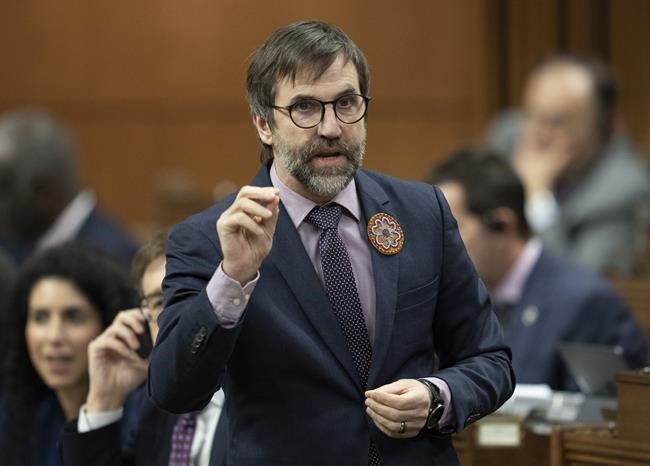Alberta's nine-month silence over two releases of toxic oilsands tailings water is "worrisome," says federal Environment Minister Steven Guilbeault.
"It is very worrisome that for over half a year, the Alberta regulator did not communicate with (Environment Canada), nor did they communicate with the Indigenous nations," Guilbeault said Thursday in Ottawa.
Alberta has an agreement with Ottawa that all such events must be reported promptly to the federal department, which has enforcement responsibilities over water.
"We have to be notified within 24 hours," Guilbeault said.
The release was first detected in May 2022 and didn't become public until February. Guilbeault said Ottawa can't fulfil its duties around environmental enforcement if provinces keep it in the dark about problems.
Imperial Oil reported brown sludge outside one of its tailings ponds at its Kearl mine about 70 kilometres north of Fort McMurray, Alta., last May. Over the summer, the sludge was found to be tailings seeping from the pond containing high levels of toxins such as arsenic.
Neither local First Nations, the federal government, nor other jurisdictions that share the watershed such as the Northwest Territories were informed of the seepage or kept updated. It wasn't until Feb. 7 that the Alberta Energy Regulator publicly released an environmental protection order — after another 5.3 million litres of tailings at Kearl escaped from a catchment pond.
A spokesman for Alberta Environment Minister Sonya Savage said both that department and Alberta Energy knew as little as anyone else about leaks until the regulator's notification in February.
"Alberta Environment and Alberta Energy were first briefed by the regulator on Feb. 7," Miguel Racin said Thursday. "That's consistent with what we've said all along."
In Alberta, such incidents are normally reported first to the Environmental, Dangerous Goods and Emergencies call centre operated by Alberta Transportation, a government ministry. Reports involving the oilpatch are then passed to the regulator.
"Alberta EDGE manages all (Transport of Dangerous Goods) emergency calls and assesses the severity of dangerous goods incidents," says the department's website. "(It) communicates openly with other regulatory agencies, such as the Alberta Energy Regulator, in the event of an emergency or safety-related incident."
Premier Danielle Smith has blamed Imperial for the slow communications around the releases and demanded what she called "radical transparency" from energy companies.
But the Athabasca Chipewyan First Nation and Mikisew Cree First Nation have both criticized the United Conservative Party government's silence on the spill, saying their people harvested on lands near the spill for months without knowing of the potential hazards.
The Northwest Territories has said Alberta violated the terms of their bilateral agreement, which obliges either party to let the other know about anything affecting water quality. The territory has initiated the agreement's dispute settlement mechanism.
Thompson and Savage are to meet in April to discuss the matter. If the N.W.T. isn't satisfied with the results, Premier Caroline Cochrane said she'd invite Smith north to meet with Indigenous leaders to talk about water quality.
"If there's no satisfaction, I will be addressing it further," she said in the legislature. "This cannot be acceptable."
Guilbeault said the case points to the need for a better system of monitoring and reporting.
"When I say we need to find better mechanisms, that’s what I’m talking about," he said.
Over the last two days, Guilbeault has spoken with chiefs from both concerned First Nations.
"They requested immediate action to address monitoring and transparency that would minimize the immediate threat and begin to rebuild trust," Guilbeault said in a statement.
"We discussed ways in which communication between federal, Indigenous, provincial and industry could be made better so that everyone has all the information they need, and we address the breakdown of communication that occurred."
Environment Canada is investigating the spill and seepage, which still continues.
This report by The Canadian Press was first published March 9, 2023.
Bob Weber, The Canadian Press



